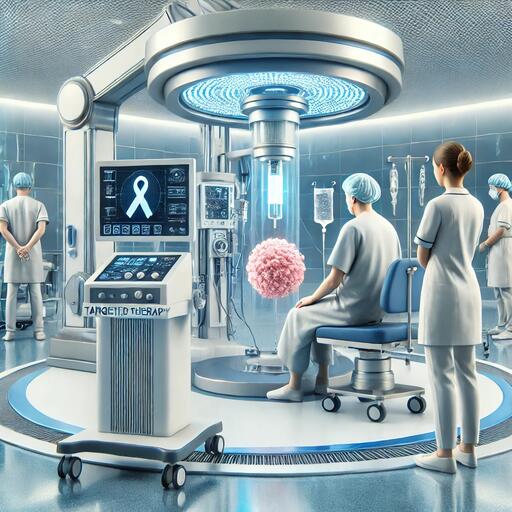Targeted therapy in India offers advanced cancer treatment by focusing on specific molecules involved in tumor growth. With costs starting around ₹2,50,000, this therapy is available at leading hospitals equipped with cutting-edge technology and experienced oncologists. The treatment is highly personalized, ensuring better outcomes for eligible patients. Consultations and diagnostic evaluations are essential to determine suitability for this innovative approach.
Medical disclaimer: This content is for general awareness and does not replace a doctor’s consultation. For diagnosis or treatment decisions, consult a qualified specialist.
At a Glance: Key Takeaways About Targeted Therapy in India
Targeted therapy is a cutting-edge cancer treatment that focuses on specific molecules to inhibit tumor growth. It is widely available in India, offering a cost-effective alternative to treatments in many other countries.
- Choose targeted therapy when conventional treatments are ineffective or unsuitable.
- Opt for it if your cancer type has identifiable molecular targets.
- Consider other options if your cancer lacks specific biomarkers.
- Discuss with your oncologist to evaluate eligibility and benefits.
- Ensure access to follow-up care for optimal outcomes.
Costs & Factors: Typical Ranges for Targeted Therapy
What Are the Average Costs in India?
Targeted therapy in India typically costs between ₹1,80,000–₹3,60,000 (≈ $2,150–$4,350 USD) per cycle, depending on the type of cancer and drug used. This is significantly lower compared to costs in Western countries, making India a preferred destination for medical tourists seeking advanced cancer care.
Factors That Influence Pricing
The cost of targeted therapy can vary based on factors such as the specific drug prescribed, the number of treatment cycles required, and the hospital or clinic chosen. Additional costs may arise from diagnostic tests, imaging, and supportive care during the treatment process.
Hidden or Additional Costs to Consider
Patients should also account for expenses like travel, accommodation, and post-treatment monitoring. Some therapies may require combination treatments, which can increase overall costs. Always discuss a detailed cost breakdown with your healthcare provider to avoid surprises.
How It Works: Steps & Workflow of Targeted Therapy
Initial Diagnosis and Testing
Before starting targeted therapy, doctors perform detailed diagnostic tests, including genetic profiling and biomarker analysis, to identify specific molecular targets in the cancer cells. This ensures the therapy is tailored to the patient’s unique cancer type.
Administering the Therapy
Targeted therapy is typically administered through oral medications or intravenous infusions. The treatment is often given in cycles, allowing the body to recover between sessions. The exact regimen depends on the drug and the patient’s condition.
Monitoring and Follow-Up Care
Regular monitoring is crucial to assess the therapy’s effectiveness and manage any side effects. Follow-up care may include blood tests, imaging scans, and consultations with oncologists to adjust the treatment plan as needed.
Who It’s For: Eligibility & When to Choose It
Targeted therapy is ideal for patients whose cancers have specific genetic mutations or biomarkers that can be targeted by the treatment. It is often recommended for advanced or metastatic cancers where traditional treatments like chemotherapy or radiation may not be effective. However, eligibility depends on factors such as the type and stage of cancer, overall health, and prior treatments. Discussing your case with an oncologist is essential to determine if targeted therapy is the right choice for you.

Benefits & Risks: What to Expect from Targeted Therapy
Key Benefits of Targeted Therapy
Targeted therapy is a cutting-edge treatment that focuses on specific molecules involved in cancer growth, offering a more precise approach than traditional chemotherapy. This can result in fewer side effects and improved outcomes for certain cancers. Additionally, it may enhance the effectiveness of other treatments when used in combination.
- Minimizes damage to healthy cells
- Customizable based on genetic testing
- Often suitable for advanced or resistant cancers
Potential Risks and Side Effects
While targeted therapy is generally well-tolerated, it can still cause side effects such as fatigue, skin issues, or gastrointestinal discomfort. In some cases, patients may experience more serious effects like liver problems or blood clotting abnormalities, depending on the drug used.
- Common: nausea, fatigue, rash
- Rare: heart or liver complications
- Requires regular monitoring for adverse effects
Timeline & Aftercare: First 4–12 Weeks
The initial weeks after starting targeted therapy are crucial for monitoring your response and managing side effects. Most patients begin to notice improvements or stabilization of their condition within the first month. Regular follow-ups, including blood tests and imaging, are essential to track progress and adjust the treatment plan if needed.
Aftercare typically involves maintaining a balanced diet, staying hydrated, and managing stress to support overall health. Your doctor may recommend specific medications or supplements to address side effects like fatigue or nausea. Adhering to the prescribed schedule is critical for optimal results.
- Weekly or bi-weekly follow-ups initially
- Monitor for any new or worsening symptoms
- Focus on nutrition and hydration
Alternatives & When They Fit Better
Other Treatment Options Available
Alternatives to targeted therapy include chemotherapy, immunotherapy, and radiation therapy. Chemotherapy uses drugs to kill rapidly dividing cells, while immunotherapy boosts the immune system to fight cancer. Radiation therapy targets specific areas with high-energy rays to destroy cancer cells. These options may be used alone or in combination, depending on the cancer type and stage.
- Chemotherapy: effective for widespread cancers
- Immunotherapy: enhances immune response
- Radiation: localized treatment for specific tumors
When to Consider Alternatives
Alternatives may be more suitable if targeted therapy is ineffective or unavailable for your cancer type. Patients with cancers lacking specific molecular targets or those who cannot tolerate targeted drugs due to severe side effects might benefit from these options. Your oncologist will guide you based on your medical history and treatment goals.
- When genetic testing shows no actionable targets
- If side effects from targeted therapy are unmanageable
- For cancers better treated with systemic approaches
Latest Updates & What’s Changing in Targeted Therapy
Recent advancements in targeted therapy include the development of next-generation drugs that address resistance to earlier treatments. Researchers are also exploring combination therapies that pair targeted drugs with immunotherapy for enhanced effectiveness. These innovations are expanding options for patients with previously untreatable cancers.

- Next-gen drugs for resistant cancers
- Combination therapies showing promise
- Broader applications for rare cancer types
How to Choose the Right Provider for Targeted Therapy
Top Factors to Consider
When selecting a provider for targeted therapy, prioritize hospitals with a dedicated oncology department and access to advanced diagnostic tools. Look for facilities that offer multidisciplinary care, including oncologists, pathologists, and genetic counselors. Accreditation by NABH or JCI ensures adherence to high-quality standards.
Questions to Ask Your Doctor
Ask your doctor about the specific type of targeted therapy recommended and its expected outcomes. Inquire about potential side effects, the duration of treatment, and whether genetic testing is required. Additionally, confirm if the hospital has experience treating your specific cancer type with targeted therapy.
Key Differences: Side-by-Side Comparison
Targeted therapy differs from traditional chemotherapy in its precision and reduced side effects. While chemotherapy attacks all rapidly dividing cells, targeted therapy focuses on specific molecules driving cancer growth, making it more effective for certain cancers.
| Dimension |
Targeted Therapy |
Chemotherapy |
| Candidacy |
Specific genetic mutations |
Broad cancer types |
| Durability/Effectiveness |
High for targeted cancers |
Varies by cancer type |
| Medications |
Oral or IV drugs |
Primarily IV drugs |
| Recovery Time |
Minimal downtime |
Longer recovery |
| Risks |
Fewer side effects |
Higher toxicity |
| Cost |
₹2,50,000–₹6,00,000 |
₹1,50,000–₹3,50,000 |
Targeted Therapy in Top Hospitals Across India
India is home to several renowned hospitals offering targeted therapy, such as AIIMS, Tata Memorial Hospital, and Apollo Hospitals. These institutions are equipped with cutting-edge technology and experienced oncologists specializing in personalized cancer care. Many also provide access to clinical trials for innovative treatments.
Costs for targeted therapy in India typically range from ₹2,50,000–₹6,00,000 (≈ $3,000–$7,250 USD), depending on the type of cancer and duration of treatment. International patients often choose India for its affordability and high-quality care.
- AIIMS: Affordable, government-run care
- Tata Memorial: Specialized in oncology
- Apollo Hospitals: Advanced diagnostics and therapies
Preparing for Targeted Therapy Treatment
Preparation for targeted therapy involves a thorough evaluation, including genetic testing to identify specific mutations. Your doctor may also recommend imaging tests or biopsies to confirm the suitability of this treatment. Discuss any ongoing medications to avoid potential interactions.

Maintain a healthy lifestyle before starting therapy. Eat a balanced diet, stay hydrated, and manage stress through relaxation techniques. Your healthcare provider may also advise vaccinations or preventive measures to reduce infection risks during treatment.
- Complete all recommended tests
- Discuss potential side effects
- Follow dietary and lifestyle advice
Managing Side Effects During Targeted Therapy
Targeted therapy can cause side effects such as fatigue, skin changes, and gastrointestinal issues. These effects vary based on the specific drug and individual response. Patients are typically monitored closely to adjust doses or provide supportive care as needed.
To manage side effects effectively, doctors may recommend lifestyle changes, hydration, and medications to alleviate symptoms. For example, anti-nausea drugs or topical creams can help with common issues. Early communication with your healthcare team is crucial for timely interventions.
- Stay hydrated to combat fatigue and dehydration.
- Use prescribed creams for skin irritation.
- Report any unusual symptoms immediately.
Long-Term Outcomes and Survival Rates
Targeted therapy has significantly improved survival rates for many cancers, particularly when genetic mutations are identified early. These treatments often provide better outcomes compared to traditional chemotherapy for eligible patients.
While long-term outcomes depend on cancer type and stage, targeted therapies are known for their precision and reduced impact on healthy cells. This approach can lead to prolonged remission and improved quality of life for many patients.
- Higher survival rates in mutation-specific cancers.
- Reduced recurrence risk with ongoing monitoring.
- Improved quality of life compared to traditional methods.
The Role of Genetic Testing in Targeted Therapy
Genetic testing plays a critical role in determining the suitability of targeted therapy. By identifying specific mutations or biomarkers, doctors can tailor treatments to attack cancer cells more effectively while sparing healthy tissues.
Patients with cancers like lung, breast, or colorectal often benefit from genetic profiling. This testing ensures that the therapy chosen aligns with the unique genetic makeup of the tumor, increasing the likelihood of success.
- Identifies actionable mutations for precise treatment.
- Helps avoid ineffective therapies.
- Guides decisions on combining treatments.
Combining Targeted Therapy with Other Treatments
Targeted therapy is often combined with other treatments like chemotherapy, radiation, or immunotherapy to enhance effectiveness. This multimodal approach can address cancer from multiple angles, improving outcomes for advanced or aggressive cases.
Combination strategies are tailored to the patient’s condition and cancer type. For example, targeted therapy may shrink tumors, making surgery or radiation more effective. However, combining treatments can also increase the risk of side effects, requiring careful management.
- Boosts overall treatment efficacy.
- May reduce tumor size for surgical options.
- Requires close monitoring for side effects.
Insurance and Financial Assistance for Targeted Therapy
Insurance coverage for targeted therapy in India depends on your policy and provider. Many health insurance plans now include cancer treatments, but it’s essential to confirm specifics with your insurer. For those without insurance, some hospitals offer financial aid programs or payment plans. Exploring government schemes or charitable organizations can also help reduce the cost burden of targeted therapy.
Discover the Best Oncologists and Cancer Hospitals in India
When it comes to cancer treatment, finding the right specialist and hospital can make a significant difference in the outcome. In this blog, we have compiled a list of the top oncologists and cancer hospitals across major cities in India, ensuring that you have access to the best care available.
Top Oncologists in Major Cities
For those seeking expert oncologists, we have identified the best specialists in key cities:
Leading Cancer Hospitals
In addition to finding the right specialist, choosing the right hospital is crucial for comprehensive cancer care. Here are the top hospitals in major cities:
Get more indepth information on Cancer treatments and their costs
Conclusion
Finding the right oncologist and hospital is the first step in your cancer treatment journey. Explore the links above to learn more about the top specialists and hospitals in your area.